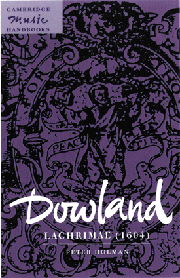6 - Reception
Published online by Cambridge University Press: 02 December 2009
Summary
John Dowland was a prophet largely without honour in his own land. He was one of the most famous lutenists in Europe, yet he had to wait until he was nearly fifty before he received a post at the English court. He was one of the greatest English composers of his time, yet his music was quickly forgotten by his compatriots. The lute song was superseded in the 1620s by new types of continuo song. The brilliant and elaborate type of lute music he cultivated gave way about the same time to slighter and less demanding idioms from France using the new Baroque tunings. And the great idiom of Elizabethan consort dance music, brought to its highest point by Dowland, was quickly replaced by new forms and styles. The pavan and the galliard gave way to new and lighter dances such the almand, corant and saraband, scored for lighter and smaller combinations of violins and viols with theorboes. Although some Jacobean consort music continued to be copied until after the Restoration, none of the Lachrimae pieces exists in later English sources.
However, Dowland's music survived for rather longer in the Anglo-German consort repertory. Thomas Simpson included settings of ‘Antiquae Novae’ and ‘Langton’ in his Opusculum neuwer Pavanen, pairing them with his own related galliards; Konrad Hagius printed his own setting of ‘Essex’ in his partly lost Newe künstliche musicalische Intraden (Nuremberg, 1616), wrongly entitling it ‘Pypers Galliard’; and Simpson included a version of ‘Nichol’ in Taffel-Consort (Hamburg, 1621), using the new ‘string quartet’ scoring of two sopranos, tenor and bass with a continuo part rather than Dowland's five-part scoring with a single soprano.
- Type
- Chapter
- Information
- Dowland: Lachrimae (1604) , pp. 75 - 80Publisher: Cambridge University PressPrint publication year: 1999



